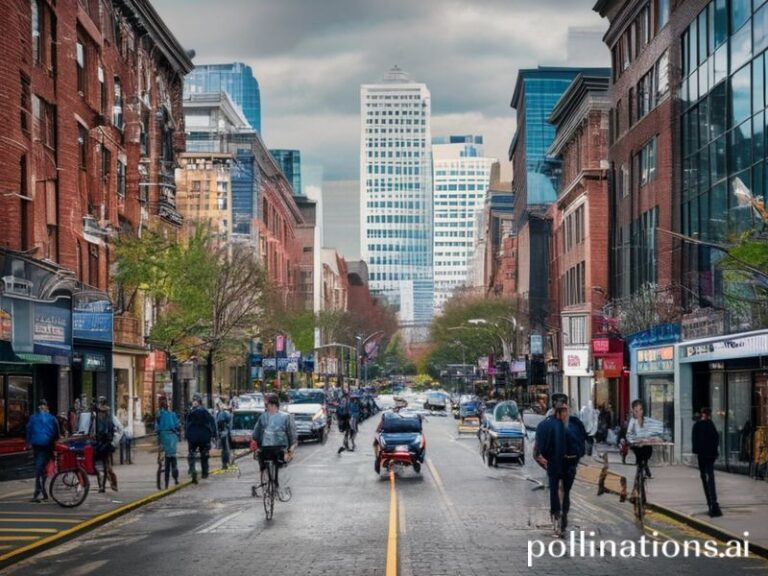Global Passport Backup Plans: How Britain’s Redundancy Scheme Reveals the Fragility of Modern Citizenship
Passport Panic Goes Global: The Foreign Office’s Backup Plan and the Paper Chase of Modern Citizenship
By Our Man in the Queue, Somewhere between Terminal 3 and Existential Dread
If the 20th century taught us anything, it’s that passports are just polite permission slips from the state allowing you to flee your own tax code. The 21st century, never one to be outdone, has added a fresh wrinkle: entire governments now misplace their own citizens’ identities with the same élan they once reserved for foreign wars. Enter the UK Foreign Office’s freshly unveiled “Passport Backup Plan,” a bureaucratic lifeboat designed for the day the mothership of state finally sinks beneath a sea of shredded documents, cyber-ransomware, and whatever Boris left in the photocopier.
The premise is elegantly apocalyptic: should Her Majesty’s Passport Office (motto: “We’re sorry, the queue you are joining has been outsourced to a call center in Chennai”) suffer a catastrophic data loss, consulates from Bangkok to Bogotá will be able to regenerate your nationality faster than you can say “hostile environment policy.” The plan involves encrypted biometric vaults, blockchain-inspired ledgers, and—because nothing says cutting-edge like 1970s tech—a microfiche fallback stored in a salt mine under Cheshire. It is, in short, a global insurance policy against the day some intern spills coffee on the server marked “Everyone.”
Naturally, the rest of the planet is watching this British experiment the way one watches a neighbor install a shark-proof moat: equal parts admiration and suspicion. Canada has already asked for the source code, politely. The French have declared the scheme “typically Anglo-Saxon” while secretly drafting their own dossier titled “Plan B: Liberté, Égalité, Redondance.” Meanwhile, the United States—ever the innovator—has skipped redundancy altogether and simply raised the renewal fee to $420, reasoning that if you can’t afford the passport you probably don’t deserve to leave.
Emerging economies see things differently. Kenya’s new e-passport rollout melted down last month when a single gecko short-circuited a transformer in Nairobi, proving that nature remains the final systems administrator. Across the Indian Ocean, Indonesia is piloting a QR-code tattoo option—voluntary for now—because nothing says “welcome home” like a barcode on your wrist. The lesson: if you’re poor, redundancy is a luxury; if you’re rich, it’s a branding opportunity.
The darker punchline is that passports have quietly become the last universally accepted ID in a world busy Balkanizing itself. Try opening a bank account in Berlin or boarding a train in Tokyo without one and you’ll discover that a driver’s license from Delaware carries roughly the same gravitas as a Chuck E. Cheese token. The Foreign Office’s backup plan therefore isn’t merely about travel; it’s about preserving the illusion that somewhere, in some salt mine or server farm, your right to exist is still on file. When that illusion flickers, so does the entire choreography of global movement—supply chains, academic conferences, destination weddings, refugee corridors. Even the Taliban, bless their retro hearts, now issue passport-ish documents with foil stamps. Nothing says “we’re open for business” like a good hologram.
And yet, for all the blockchain bluster, the plan still relies on a human consular officer squinting at a bleary traveler and deciding whether the face on the screen matches the face in front of them—a subjective algorithm older than passports themselves. One typo, one hangover, one surly gaze and you’re stateless in a Holiday Inn Express outside Istanbul, reduced to reciting your national anthem to prove you’re not from Liechtenstein.
So what does it all mean, beyond confirming that paranoia is the mother of invention? Simply this: passports are the last paper promise states still bother to keep. When governments start backing up that promise like paranoid photographers saving JPEGs to three clouds and a thumb drive, it’s a tacit admission that the original is already corrupted. The backup plan, then, isn’t Plan B; it’s the autopsy of Plan A. And somewhere in that Cheshire salt mine, next to the microfiche and the emergency gin, sits a lonely civil servant updating the metadata for 67 million almost-citizens, praying the power stays on long enough to finish the job.
Welcome to the future: same bureaucracy, extra redundancy, batteries not included. Please have your backup QR code ready at the gate.







